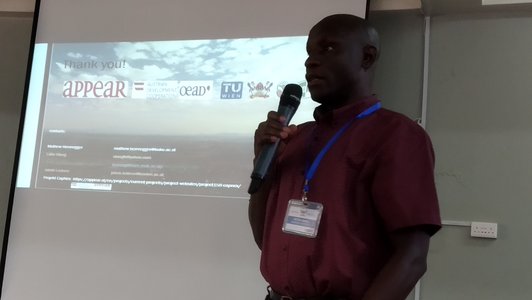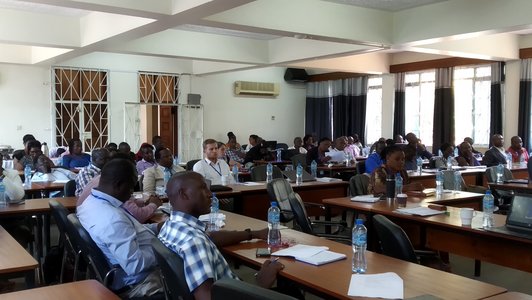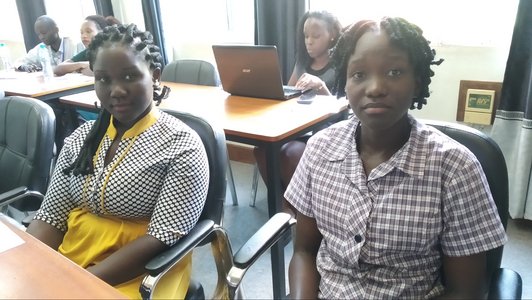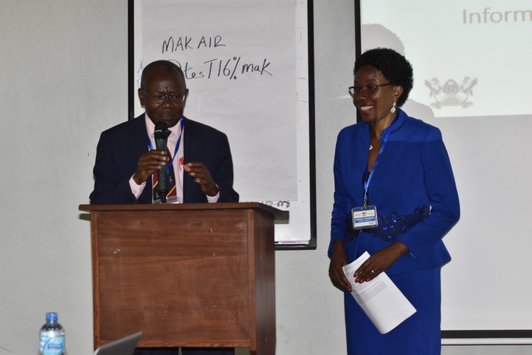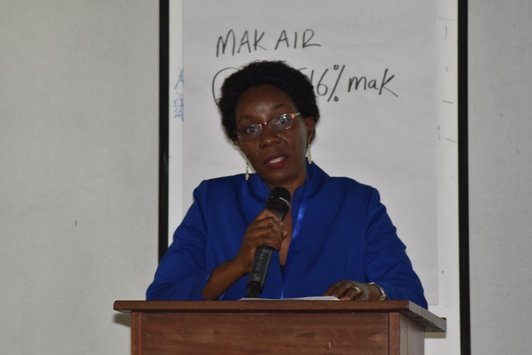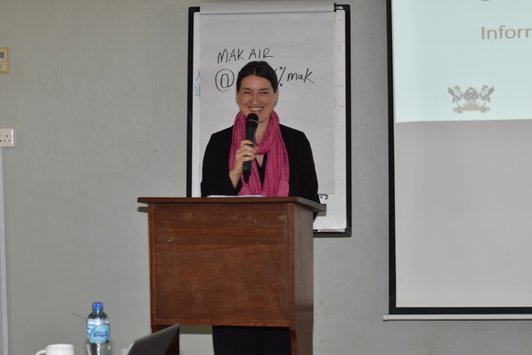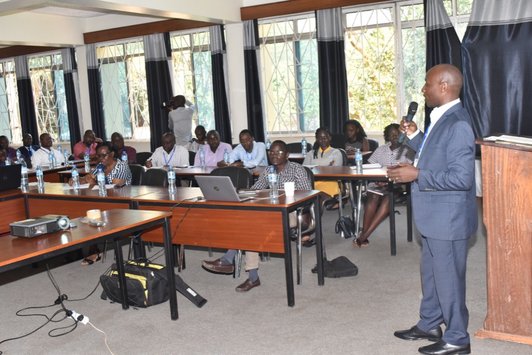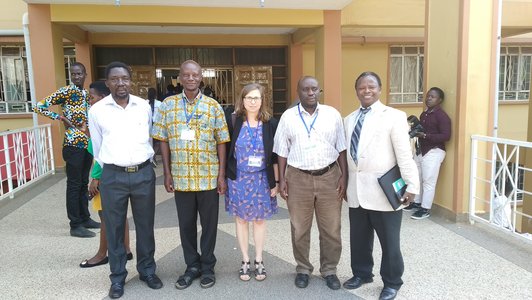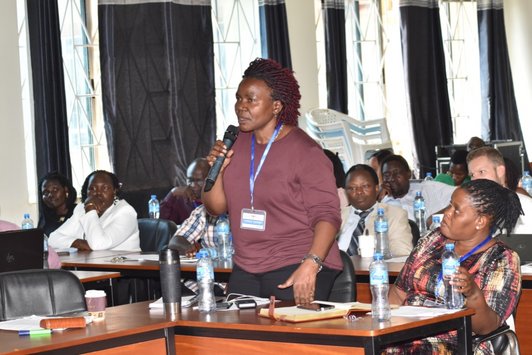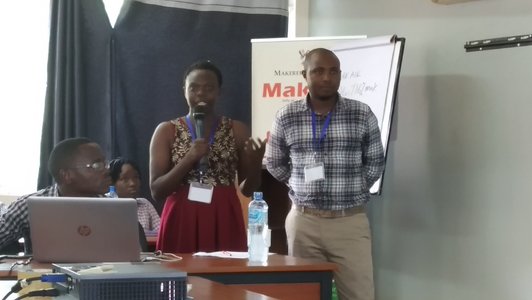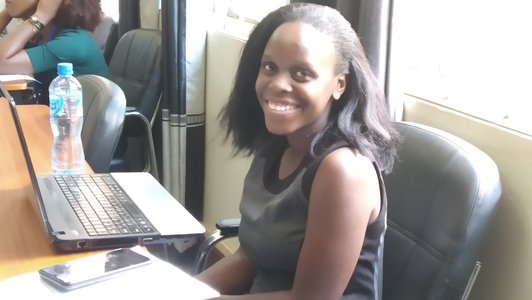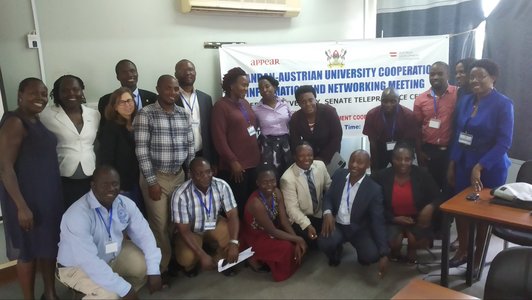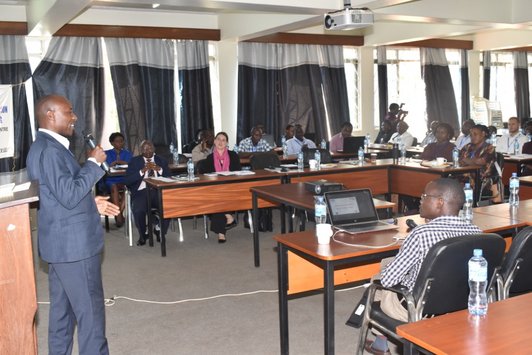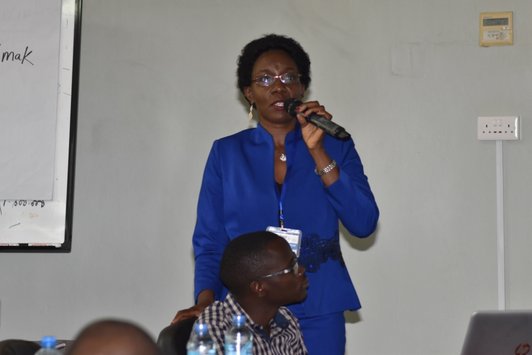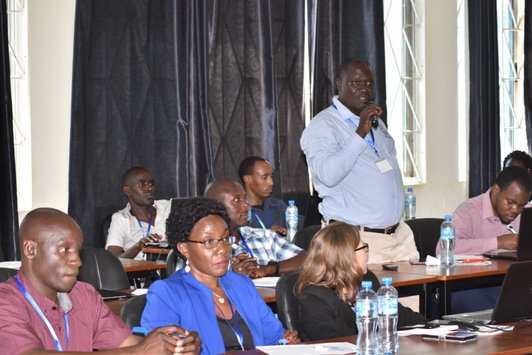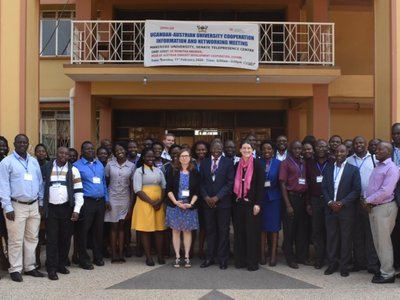

The event highlighted the existing higher education cooperation between Uganda and Austria. In his welcome address Prof. Bernard Bashasha, as representative of the Deputy Vice Chancellor Academic of Affairs, focused on the value of partnerships based on principles such as equality, mutual respect, diversity and mutual learning. He said: “It is from such partnerships that universities are able to achieve one of their cardinal roles: generation of knowledge and innovation for the betterment of society”. He acknowledged that the Austrian government has for the past three decades funded programmes, such as APPEAR, that have benefited not only Makerere but also other universities through promoting continuous professional development of the staff. He further recognized some of the recently funded projects that he considered not only useful in solving some of the daily challenges in communities but also as very relevant to national development. To conclude, he encouraged participants to make use of the opportunity to network and learn from scholarship holders and project findings.
Dr. Roswith Kremser, the Head of the Austrian Embassy Development Cooperation Uganda stated that being alumna of the University of Vienna, one of the oldest universities in Europe, she believes in the importance of the long lasting (academic) cooperation in advancing development between higher education institutions in Uganda and Austria. In her conclusion she was hopeful that this meeting would be a basis for new relationships and the continuation of strong existing relationships for advancing research in Austria and Uganda. She underlined that Austria too, could learn a lot from Uganda especially on topics such as management of climate change.
Former scholarship holder Prof. Eddy Walakira, the Head of the Department of Social Work and Social Administration at Makerere University shared his experiences during his studies in Austria. “I am what I am partly because of the Austrian Government” he said. His journey as a PhD candidate in Social and Cultural Anthropology at the University of Vienna started in 2006. He stressed the good relationships with his scientific supervisors and the kind of academic freedom he experienced, which was very different from the top down learning provided elsewhere. This system helped him to become a very productive academic and he was even promoted to the level of Associate Professor. Furthermore, he shared some personal stories such as meeting new friends and going skiing to the Austrian Alps, which was a unique experience for him.
In her presentation Elke Stinnig from OeAD gave an overview of the higher education cooperation between Uganda and Austria. She highlighted that the North-South-Dialogue Scholarship Programme to finance PhD studies in Austria already started in 1984. Due to the new Strategy on Higher Education and Research by the Austrian Development Agency it was replaced in 2009 by APPEAR which follows a more institutional approach in capacity building.
She underlined that the selection process of APPEAR projects is highly competitive as certain principles need to be addressed in the proposal: an open-minded concept of knowledge, science and empirical research, a participatory and demand-driven approach in education and research, as well as gender sensitivity. Furthermore, the impact on the specific target groups in the respective countries is a factor that has to be considered.
Outcomes and Lessons Learned from APPEAR Projects
Following this introduction to APPEAR, the former scholarship holder and researcher at Makerere University, Dr. Peter Akoll, presented the project STRECAFISH, a regional partnership between Makerere University, University of Eldoret, the National Fisheries and Aquatic Life Research in Ethiopia and the University of Natural Sciences and Life Sciences (BOKU). The project’s main objective was to build regional capacity in higher education and research in the field of aquaculture and fisheries. Activities such as reviewing and realigning the curriculum to meet stakeholder demands, promoting capacity building and fostering aquaculture, not just for PhD and Master students but also for the community, took place. He stated that fish farmers and members of the Women Fish Network in Uganda and also farmers in Ethiopia were trained under this programme. Further achievements are the award of a bigger project on Collaborative training in Fisheries and Aquaculture, funded by the EU and the establishment of a regional network among the partner institutions which is seen as added value by APPEAR.
Another APPEAR project which was presented is PROSOWO. It was also very successful in building a regional network involving six East African institutions. Dr. Janestic Twikirize who served as the regional and national coordinator between 2010 and 2018 stated that the aim of the project was to strengthen professional social work in Eastern Africa. For a project with so many partners some of the reasons for their success were: having common interests, the long-lasting cooperation and the centrality of relationships. “I call it putting a human face to the partnerships and you become friends.” This later translates into more effectiveness. The philosophy of ubuntu, that provided a strong foundation even amidst conflicts during the projects and finally, the importance of cultural awareness and respect for diversities were guiding them. Due to the colonial history of the profession of social work there was an inherent need for more indigenous and culturally relevant practice. Major achievements presented included the launch of two extensive studies on the contribution of professional social work in the region, the publication of several books and the elaboration of locally relevant teaching materials. Various dissemination workshops were also conducted and over 30 presentations in conferences were held. There was advocacy and networking across the East African Community and six PhD scholarships have been supported under the project. Lastly, she mentioned that there was a launch of an MA programme in Social Work in Tanzania and Uganda. For Makerere University it had already been approved and ready for implementation. For the purpose of sustainability, she mentioned that a MoU was signed among the members leading to the development of the East African Center of Research and Innovation in Social Work so that the collaboration does not end with APPEAR.
The next project, AER was presented by two current scholarship holders and PhD candidates at BOKU, Mary Deous Ekyaligonza and Thaddeo Kahigwa Tibasiima. The objective of the ongoing partnership is to strengthen higher education, research and community outreach in agro-ecology in the Rwenzori Region in Western Uganda. This region faces enormous challenges such as overexploitation of its natural resources and increasing poverty among small scale farmers. The main objective was to develop a regionally embedded curriculum for an MA programme in Agro-Ecology based on the socio-economic and ecological challenges in the region by using participatory methods and including local stakeholders. The new curriculum was approved by the National Commission in Higher Education (NCHE) only a few weeks ago and will be implemented from August 2020 onwards. The week before the new MA programme was officially launched, an agro-ecological demonstration unit was opened. Other activities include the developemt of locally relevant teaching materials and, strengthening the capacity of teachers, like Mary Ekyaligonza and Thaddeo Tibasiima who will be lecturers once the programme has started.
The last APPEAR project, CapNex, was presented by Prof. Jeninah Karungi-Tumutegyereize from Makerere University. The aim of the project was to build capacity on the water-energy-food security nexus through research and training in Kenya and Uganda. It was implemented in partnership with Makerere University, Technical University Kenya, BOKU and Technical University Vienna. The Sio-Malaba-Malakisi Basin on the border of Uganda and Kenya was chosen as the project area due to the high population pressure on resources. Among the major findings presented was that the water quality was usually not good especially during the wet season where nitrates and phosphates were found to be above the recommended levels. Not only was the water quality low but there was also a lot of soil erosion. Hence, effective soil-water conservation would be required. From According to a survey conducted as part of the project, the soil conservation mechanisms were better in Kenya compared to Uganda. Furthermore, six PhD and master’s students contributed to the research results and several publications. Dissemination of findings to the community and policy dialogues with the Ministry are very much in line with APPEAR requirements. Jeninah Karungi-Tumutegyereize concluded that, “from my experience, I have had a very good working relationship with the Austrian partners.
International Post-Graduate Training in Limnology (IPGL)
In the field of limnology, the study of inland aquatic ecosystems, a long-lasting collaboration exists between Austria, Uganda and other countries in the regions. Peter Akoll explained that it started already in 1975 as a small certificate course in limnology for scientists from developing countries in Austria. However, at the beginning the participation of African students was very low. In 1994, two trainings were offered and the engagement with African institutions commenced. In the following years and in collaboration with UNESCO the certificate course was further developed to a degree programme. In an effort to cement the partnership, a joint master’s degree hosted at UNESCO-IHE and BOKU now Egerton was started and the engagement of African partner increased. In 2013, they began supporting African institutions to start a joint degree with technical support from BOKU. In 2014, Peter Akoll stated that through collaborations, STRECAFISH was born where Makerere University is also involved. The evolution of IPGL according to him reflected the need to keep a programme relevant and the collaboration not only between Austria and Uganda but within the region sustainable. IPGL has maintained the network of the alumni. In 2020 IPGL will launch a web-based network platform called AQUAHUB. Also, an impact assessment will be conducted to improve the network and cooperation among members.
In her final presentation Elke Stinnig gave information on studying and researching in Austria. She presented important websites as well as funding possibilities (please find details and links below). Reporting on the APPEAR evaluation, she noted that APPEAR was found to be “doing the right thing” and hence the funding agency ADA is confident to continue with APPEAR. A bridging call between the current and the coming phase is envisaged.
Furthermore she presented the Austrian-African Research Network (Africa-UniNet) (www.africa-uninet.at), a new initiative financed by the Federal Ministry of Education, Science and Research (BMBWF). During the kick-off meeting and first General Assembly took place from 30-31 January 2020 in Vienna the network was officially inaugurated and the working programme with first activities was specified. 63 African and 19 Austrian universities and research institutions participated, among them African Rural University, Islamic Call University College, Kabale University, Kyambogo University, Makerere University, Nkumba University, St. Lawrence University. Dr. Musinguzi who represented Makerere University at the General Assembly in Vienna summarized the outcome of the meeting and encouraged people to be alert.
Finally, Elke Stinnig mentioned the Erasmus+ programme under EU and encouraged people to look for opportunities from various programmes and to actively network to find future cooperation partners. She stressed that for OeAD it is of special concern to stay in contact with former scholars and to support them in networking and the development of scientific cooperation between Austria and their countries of origin. Therefore she requested to check on the alumni services provided by OeAD.
Important links
Study in Austria gives an overview of the Austrian higher education system, lists universities including profiles and contact details and can be used to look for possible partners.
The English-language study guide explains the higher education system in Austria, offers useful tips to foreign students and lists all degree programmes offered by Austrian higher education institutions.
If you are looking for study options in Austria by field of study, location, final degree or language of instruction (various international study programmes taught in English) you may check the following Website: www.studienwahl.at/en
Euraxess Austria provides information on and assistance for all questions essential to the mobility of researchers and their families. It is part of the EU initiative ‘Euraxess – Researchers in Motion’ ec.europa.eu/euraxess. Furthermore it offers job vacancies for researchers throughout Europe.
The Austrian Database for Scholarships and Research Grants provides students, graduates and researchers information on scholarships and grants.
Funding possibilities
The first call of the Programme Cooperation Development Research took place in 2019. The aim is to implement cooperative projects between Austrian higher education / research institutions and higher education / research institutions in countries of the global South. Projects must contribute to analysing and solving local challenges and to achieving the Sustainable Development Goals (SDGs). The programme is open to all scientific disciplines. One- to three-year research projects mobility and material expenses for Austrian project partners and project partners from the South are funded. Another call is expected in 2020.
The Ernst Mach Follow-Up Grant is aimed at postdocs from non-European developing countries who are former OeAD scholarship holders. The grant is intended to support the applicant's scientific carrier and to further and deepen the cooperation with Austrian higher education institutions and universities.
The Ernst Mach Grant – worldwide is aimed at visiting or exchange scholars for a short research/study stay (1-9 months). Applicants must not be older than 35 years when they start their research stay. Target groups are postgraduates pursuing a doctoral/PhD programme, postgraduates and post-docs who want to do research in Austria and post-docs who are working as lecturers at a university
The Ernst Mach Grant for studying at an Austrian University of Applied Sciences is aimed at students from non-European universities who wish to spend a semester or two at an Austrian University of Applied Sciences (‘Fachhochschule’).
EU's programme to support education, training, youth and sport is run in seven-year cycles. The next one will be from 2021 to 2027 in Europe. Furthermore the Commission actively collaborates with non-EU countries in the fields of education and training policy.
→ Erasmus+ International Credit Mobility (KA107)
→ Erasmus+ Erasmus Mundus Joint Master Degrees
→ Erasmus+ Capacity Building in Higher Education
→ Erasmus+ Jean Monnet Activities
Detailed information on these opportunities, including eligibility criteria, is available in the Erasmus+ Programme Guide. An indicative funding guide for some centralised opportunities is also available.

